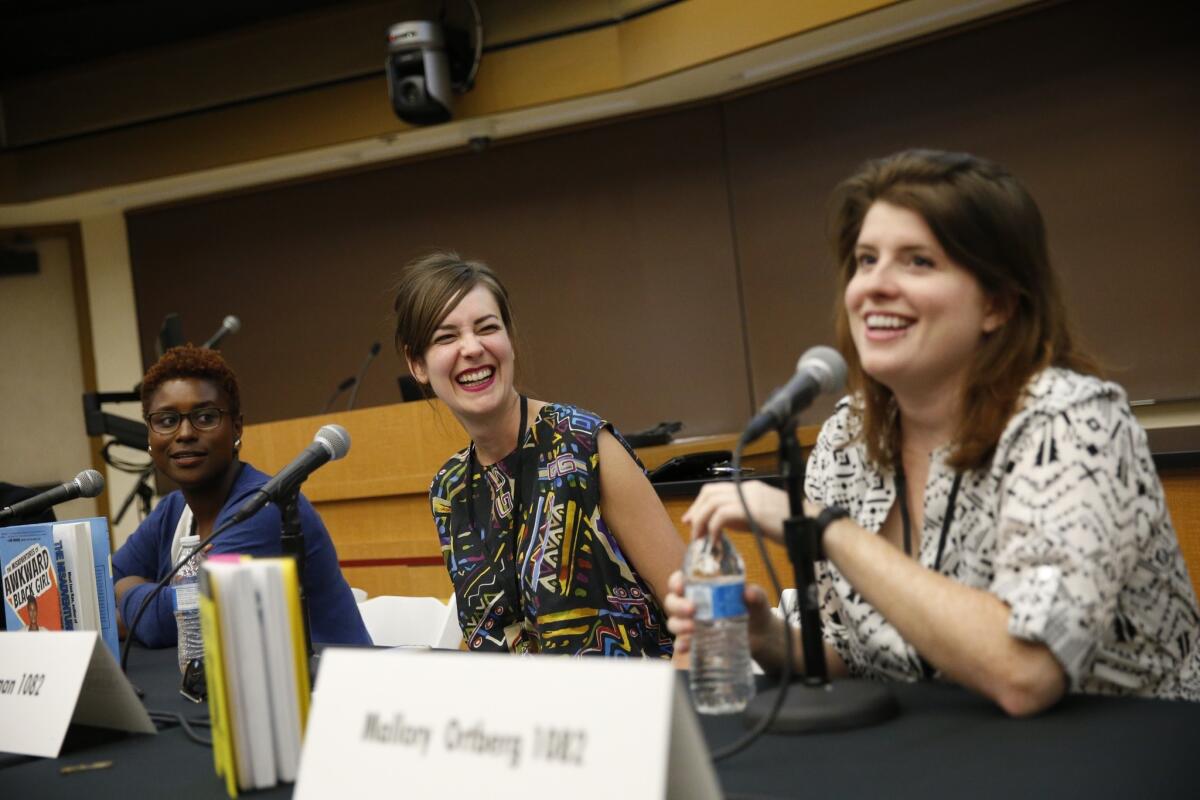Festival of Books: Is it rude to ask women humor writers how they differ?

Moderator Ann Friedman and panelist Issa Rae smile while listening to Mallory Ortberg speak on the “Writing With a Smirk: Women and Humor” panel during the 20th Los Angeles Times Festival of Books at USC.
- Share via
When asked to answer the question of whether women humor writers are different from other humor writers, panelist Mallory Ortberg at first refused to answer.
“I don’t want to answer this question. I hate you for asking this question. I pass,” she said, bluntly and almost in one breath. Then, she quickly retorted: “Fine! Fine! We’re better.”
At a panel at the Festival of Books on Saturday, Ortberg, co-creator of The Toast and author of “Texts From Jane Eyre,” Issa Rae, creator of the YouTube comedy series “Awkward Black Girl” and author of “The Misadventures of an Awkward Black Girl,” and Pamela Ribon, author, TV writer, screenwriter and actress, gathered to discuss women and humor.
FULL COVERAGE: FESTIVAL OF BOOKS
The room quickly transformed into something of a comedy club.
Ribon decided to take a whirl at the same question, framed as “How is this panel different from other panels?”
“There’s more than one woman on it,” Ribon said. The crowd applauded. Then it was Rae’s turn.
#LITIDOL: AUTHORS DISCUSS THEIR LITERARY IDOLS
“Our humor is more empathetic and loving?” she said with a hint of question in her voice, then quickly added, “I made that up.”
“Does anyone else have a sick burn they’d like to deliver?” Ortberg said, with a smirk, true to the panel’s name “Writing With a Smirk.”
The group finally stopped giving moderator and freelance journalist Ann Friedman a hard time and tried to be serious -- or as serious as a group of comedy writers could be. Ortberg offered an explanation as to why she disliked the question.
“It’s just a tough question ... because one of the things male humorists never have to do is define what is men’s humor. Are men funny? Which, I would argue, they often aren’t, but that does not stop them from getting jobs in comedy writing.”
Ortberg said women’s humor is enhanced by the different perspective it comes from.
“Humor is always more interesting when it comes from someone who’s had more than, like, five experiences,” Ortberg said. “Sometimes when it’s just dudes in comedy it’s just like, ‘Remember that time that girl didn’t like me? That was rough.’ ”
Ribon added that at the same time, women have their own form of trite humor, equivalent to those men make about getting hit in the crotch.
On the note of empathy, Rae and Ribon spoke about how they use self-deprecating humor to tell true stories about difficult times in their lives.
“It was … realizing in hindsight … ‘That person pained me, and I’m going to write about that for the world to see, ha-ha-ha-ha, I get the last laugh,’ ” Rae said. “In writing the book, it made me realize how much those experiences, of course, define me.”
The Internet, Rae and Ribon said, has been a powerful vehicle and forum for that.
“The Internet is where you find -- well, horrible people, but -- the Internet is where you find empathy the fastest,” Ribon said.
“Part of it is anonymous sharing, and part of it is it’s such an intimate, one-on-one relationship that you can achieve, where you’re, you know, talking to someone while they’re in their bed or in the bathroom or wherever they share your thoughts, that you get quickly back to ‘Oh my god, I’m mortified for you’ to ‘I did that, too,’ and then you find the humor in it.”
Both agreed that it’s important to not only talk about the experience but also its meaning.
“How did you come out of it and what did it mean for you now, I think that really helps,” Rae said. “I have too many cringe-worthy stories. Sometimes I’d send them to my editor, and she’d be like ‘but this was just horrible that happened to you. What was the point?’ So those didn’t make it in the book.”
Ortberg summed up why she had been reluctant to make “sweeping generalizations” about women.
“One of the things that would be great is to some day have so many women comedy writers that we wouldn’t say there’s just one type of female humor,” she said. “There’s lots.”
Check out the Festival of Books schedule for this weekend.
MORE FROM THE FESTIVAL OF BOOKS:
Can social media solve the social justice problem?
‘Books spawn change,’ Times’ Austin Beutner says
Follow the books section on Twitter @latimesbooks and Facebook
More to Read
Sign up for our Book Club newsletter
Get the latest news, events and more from the Los Angeles Times Book Club, and help us get L.A. reading and talking.
You may occasionally receive promotional content from the Los Angeles Times.










